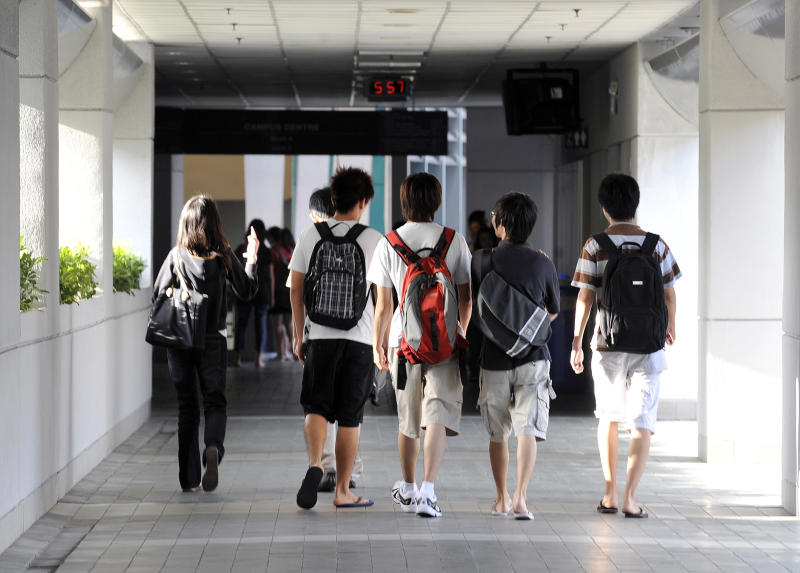Parliament: More polytechnic students to be able to sample foundation courses before specialising
Sign up now: Get ST's newsletters delivered to your inbox

The Common Entry Programme, as the scheme is called, will be offered to students taking business and information and digital technology courses from next year.
PHOTO: ST FILE
SINGAPORE - A scheme that lets engineering students at polytechnics sample foundation courses before deciding on their specialisation will be expanded to cover students in other faculties.
The Common Entry Programme, as the scheme is called, will be offered to students taking business and information and digital technology courses from next year.
The scheme aims to give students more time to discover where their strengths lie before selecting an appropriate programme.
A student in the information and digital technologies cluster, for example, will take foundational courses in computing mathematics, introduction to programming, and networking fundamentals in his first year. In his second year, he can then decide to specialise in network engineering, software programming or cyber security.
Mr Ong Ye Kung, Education Minister (Higher Education and Skills), who announced the change, said it was important that schools, post-secondary institutions and universities are geared to helping students discover their innate strengths and talents.
"Only an interest-driven choice will motivate students to want to learn their whole life, to master their professions and their craft, and to build expertise in their fields."
He agreed with Mr Seah Kian Peng (Marine Parade GRC) that currently, most polytechnic students get funnelled into occupation-specific courses right from the start.
"It is daunting and confusing for our young students, who, at age 16 or 17, have to choose from amongst 230 courses. Most of them hardly know what work life is like, much less the work nature of these specific jobs.
"While there is a small group of students who are very clear about what they want to do from a very young age, the majority of students will be in a self-discovery mode when entering polytechnics."
Mr Ong noted that polytechnic courses have proliferated, "as employers wanted graduates with specialised skills and wanted them fast". He announced that the courses will be streamlined and the number reduced by 20 per cent over the next few years.
There was a need for this as "over-specificity puts students at greater risk of being displaced when the industry changes".
He also announced the expansion of another polytechnic pathway - the Polytechnic Foundation Programme open to Normal (Academic) students who have done well in N-level exams and allows them to skip Secondary 5.
They go on to the polytechnics to do a one-year preparatory course that covers English, mathematics and domain-specific modules such as life sciences or physics.
Over 35 per cent of the first cohort of 800 students who entered the Polytechnic Foundation Programme in 2013 scored a grade point average of 3.5 and above, compared with the norm of 25 per cent of each polytechnic cohort.
As a result, the Education Ministry will expand the programme by relaxing the eligibility requirement from the current aggregate score of 11 points and below to 12 points and below.
With this change, the top 15 per cent of Secondary 4 Normal (Academic) students - about 1,500, compared with 1,200 now - will be able to take up the foundation programme next year.
But Mr Ong stressed that such changes need to be supplemented with a stronger and more systemic effort to guide students to discover where their strengths lie.
Post-secondary institutions and universities, too, have had to tweak their admission criteria to take into account aptitude and interests, something that the Institute of Technical Education (ITE), polytechnics and universities have already started doing.
Last year, the Ministry of Education expanded the aptitude-based admission target for universities to 15 per cent, up from 10 per cent previously.
The National University of Singapore also recently announced that it will give bonus points for first-choice applications, to encourage students to pursue their interests.
Mr Ong said there is scope to do more at the ITE as admission to vocational training pathways should predominantly be aptitude-based, and announced that ITE was reviewing its admission processes for some courses.
He also addressed concerns raised by several MPs, including Ms Denise Phua (Jalan Besar GRC), who asked what more could be done to position students strongly for the future.
He said that in the past, institutes of higher learning (IHLs) had the mindset that they had three to four years to prepare students before they embarked on their careers.
"So, from the word 'go', IHLs are in a race against time to pack in foundational knowledge, industry-related skills, inter-disciplinary skills and work attachments.
"The result is a hectic and technically intensive curriculum. Employers often comment that Singapore graduates know a lot of 'stuff'... but they can do better in terms of soft skills, be genuinely interested in their chosen careers, and have fire in their bellies."
But with learning becoming lifelong, IHLs realise that they have 20 or 30 years to work with students when they return for more knowledge and skills after graduation and there is no hurry to pack the curriculum, said Mr Ong.
"In this system, you learn to learn, and never really graduate. That is the essence of SkillsFuture, and the most important feature we need to build into our system to help us stay resilient in the face of an ever-changing future," he said.


